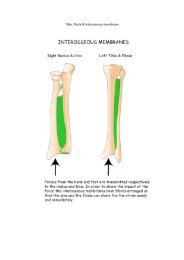GSM 11.14 - Version 5.2.0 - Digital cellular ... - Ttfn.net
GSM 11.14 - Version 5.2.0 - Digital cellular ... - Ttfn.net
GSM 11.14 - Version 5.2.0 - Digital cellular ... - Ttfn.net
You also want an ePaper? Increase the reach of your titles
YUMPU automatically turns print PDFs into web optimized ePapers that Google loves.
6.7 Command results<br />
Page 29<br />
<strong>GSM</strong> <strong>11.14</strong> version <strong>5.2.0</strong>: December 1996<br />
Once the ME has made its attempt to execute a proactive command from the SIM, the ME shall inform the<br />
SIM of the success or otherwise of that command, by using TERMINAL RESPONSE. This message gives<br />
the command details, including the number of the command (see section 6.5.1), a general result, and<br />
sometimes more specific information.<br />
Three overall categories of results are defined:<br />
- Command performed successfully. This is returned by the ME for every successful command;<br />
- Temporary problem with executing command. This is further defined below, but generally these<br />
indicate to the SIM that it is worth trying again later;<br />
- Permanent problem with executing command. These are further defined below, but generally<br />
indicate that the same command will end in the same result if repeated during the same <strong>GSM</strong><br />
session.<br />
Successful commands are further defined as:<br />
- Command performed successfully. There were no problems;<br />
- Command performed with partial comprehension. Here the ME receives a command with one or<br />
more SIMPLE-TLV data objects that are unrecognized or unexpected, all of which do not have their<br />
"comprehension required" flag set (section 12.3), but the parent BER-TLV data object still has the<br />
minimum set of SIMPLE-TLV data objects required to perform the command;<br />
- Command performed, with missing information. The ME received at least the minimum set of<br />
component parts, but did not receive all of the parts that it believed mandatory for the SIM to send.<br />
Temporary problems are further defined as:<br />
- ME is currently unable to process the command. Specific causes for this are:<br />
- the screen is busy;<br />
- ME currently busy on a call;<br />
- ME currently busy on SS transaction;<br />
- no service is currently available;<br />
- access control class barred on serving <strong>net</strong>work;<br />
- no radio resource currently available;<br />
- not in speech call.<br />
If none of these can be made to apply, a "no cause can be given" value can be used.<br />
- Network is currently unable to process the command. Specific cause values are the cause values<br />
given by the <strong>net</strong>work, as defined in <strong>GSM</strong> 04.08 [8].<br />
- The user did not accept the call set-up request. This is where the ME alerts the user before setting<br />
up a call, and the user either rejected or did not accept the "call".<br />
- The user cleared down the call, before the call connected (CONNECT received from <strong>net</strong>work, as<br />
defined in <strong>GSM</strong> 04.08 [8]) or before the <strong>net</strong>work released the call.<br />
Permanent problems are further defined as:<br />
- Command is beyond ME's capabilities. This is sent by the ME when it understands what the SIM is<br />
asking it to do, but does not have the capability to do it, e.g. ME which only supports SMS asked to<br />
set up a call.<br />
- Command type not understood by ME. This is sent by the ME when the SIM sends a command with<br />
the Type of Command byte set to a value the ME does not know. This is to allow future expansion<br />
of commands.








